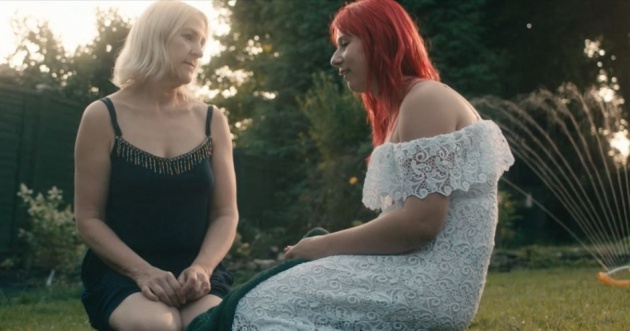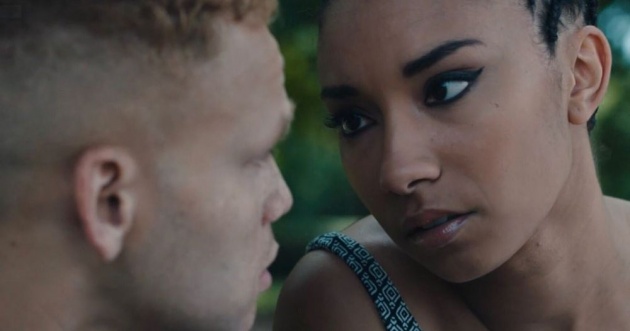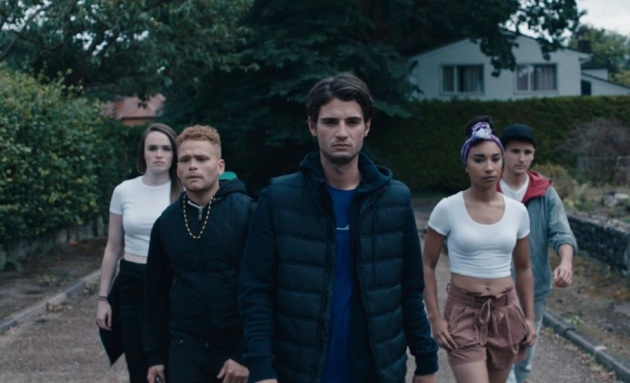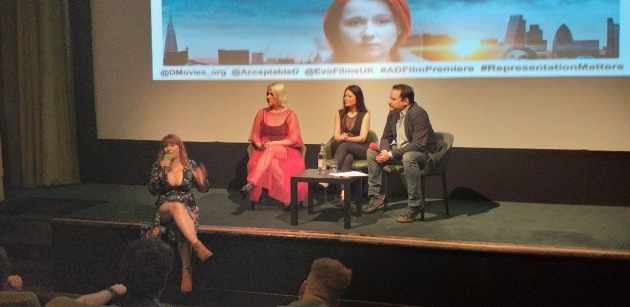
Pictured: Lucy (Fiona Whitelaw) shares a quiet moment with Katy (Elinor Machen-Fortune) in the independently produced British drama, 'Acceptable Damage'. Still courtesy of Evolutionary Films
The low-budget independently-funded British film, Acceptable Damage is a labour of love for the actress turned writer-producer Fiona Whitelaw. The London-set drama tells the story of Aspergic teen, Katy (Elinor Machin-Fortune, who also has Asperger’s) who has aspirations of being a singer but is tormented by a gang led by petty criminal Rabbit (Jack Brett Anderson), who she knew from Purple Class. He is busy enough selling dubiously-sourced trainers for his old man, Vince (Crispian Belfrage), nicking pizza from the hands of schoolchildren, tapping a girl for kebab money after having sex with her and cursing at a Benefits Official. Nevertheless he is still has time to lead a group to Katy’s house, hurl abuse and urinate on the recycling bins. These are nice bins too, decorated with a picture of green foliage, not your normal plain green muck. Katy’s mum, Lucy (Whitelaw) goes mental. Her incident log is ignored by community police officers. The local counsellor does not want to know. The police inspector, Eadda Parasca (Lavinia Simina, the film’s director) can only make insinuating threats in an Eastern European accent. Can you really blame cuts in public services for this?
Britain does not have film studios like the Americans. What it has is broadcasters – BBC, Channel Four – that function as gatekeepers for ‘quality’ British film as well as the British Film Institute and regional film boards like Screen Yorkshire that exercise similar control over the allocation of funds. Established production companies like Working Title have links to US studios, specifically Universal, and if they take an interest in your film, you have a fair chance of commercial success. Most British films are independently funded and scramble around for distribution afterwards.
The advantage of being independently funded is that there are fewer people to satisfy before you start filming. Unknowns can showcase their talent. On the minus side, you can’t pay your crew anything other than expenses. Your cast and crew need to have day jobs before they can give up time for a film like Acceptable Damage. You could say that Britain has an official and a moonlight film industry.
Simina’s day job is lecturing at the London Film Academy, an independent West London-based film school whose recent graduates include the script supervisor for the Oscar-winning Green Book. Hey, it’s paid work. She is very much a director-for-hire on this. ‘I don’t know much about disability,’ she confessed at the film’s central London premiere, ‘but I do know about being an outsider’. According to the film’s director of photography, Acceptable Damage was filmed over six days, though I suspect that excludes ‘pick ups’ like the frequent aerial shots of London in which a drone was used.
Katy is a bit of a flirt. In an early scene, we see her in a guitar shop wanting to show something to her sort-of boyfriend, Roxy (Elijah Baker). This turns out to be a recording studio in the basement. ‘I can stay here until the security guard turns up,’ she explains cheerfully. Security guard? The shop doesn’t appear to have any staff. But this is a low budget British film, we cannot afford staff. When Roxy kisses her Katy is repulsed. She experiences mental trauma, illustrated by a cut to the impression of a body pressing against a white sheet. This suggests variously feelings not getting through, being trapped, and a headache. Finding a visual language to represent mental health issues is hard, so I applaud Simina for trying. The alternative would be for Katy to present symptoms in a way that would be theatrical and perpetuate stereotypes about autism.
For the most part, Katy is an optimistic girl. She is almost untouched by the negative attention of Rabbit and his gang. It is her mother who is furious, her face a volcano of worry lines. She is the woman of agency, though her interactions with officialdom are theatrical in themselves. Most of us would send complaining emails. By contrast, in-your-face Lucy is ejected from the town hall.
The low budget manifests in unfortunate details. When Police Inspector Parasca shows Vince, Rabbit’s father, her badge, it looks like she is waving her Oyster Card, this being a pre-paid card for travel in the greater London area - my one commemorates the 2012 Olympics. Vince’s criminality is represented by standing outside the same North London pub, opening a Nike-branded box and taking some money. We never see where the boxes come from.
At another point, Rabbit gives his knife to a girl to hold onto. We know where the drama is going. ‘Knife crime’ in England is a hot topic at present, though not as much as gun crime in the United States. In England, the victims of knife crime are predominantly under the age of twenty-five. Many cases occur in London, though no one can quite agree on the cause, ascribing it variously to disputes between gangs, mental health issues and the effects of hard drugs. We know that Acceptable Damage will end in a knife incident of some kind, although the drama can go in other directions, focussing on Katy’s music, trying to come to terms with her own sexuality or proving to her mother that she can function independently.
The best scenes are the most relaxed, with Katy having dyed her hair red asking her mother to dye hers also. Simina is so fond of a shot of Katy frolicking in a white lacy dress by a sprinkler that she uses it twice. Katy’s open mike gig goes well. Interestingly, she has an accompanist but he doesn’t become a character of substance. Is he another friend or the house accompanist? (‘I do folk, heavy metal, beat box…’)
There is an odd moment that goes nowhere in which Katy has a stand-off with a deaf girl sitting in her seat on the 46 bus. The deaf girl, who converses in sign language, won’t move. Katy, who converses back in sign language pleads with her. The scene illustrates that people with different disabilities don’t identify with one another. This is significant in another context. We learn that Rabbit has reading difficulties, possibly dyslexia. He asks his father to read a letter from the benefits office. His father doesn’t want to know. Later, outside a pub, Rabbit’s father demands respect. He also won’t eat some burnt food offered by his son in a scene that only works on paper - would Rabbit eat the burnt offering himself?

Pictured: Roxy (Elijah James) gets third degree quizzing from Zoe (Adele James) in the independent British film, 'Acceptable Damage'. Still courtesy of Evolutionary Films
Roxy is caught between Katy and Rabbit. He hangs out with the latter. The reason is unclear. According to Roxy, Rabbit ‘is a hard man to say ‘no’ to’. But a girl in the gang, Zoe (Adele James) fancies Roxy. Roxy resists her. She finds out that Roxy hangs out with Katy. ‘Don’t tell anyone,’ he pleads. In the inciting incident, Rabbit’s gang enters Katy’s house because the door is open. I know that the filmmakers didn’t want to show actual criminal damage – the budget won’t allow it – but no one in London leaves their front door open unless they are unloading the shopping, taking out he rubbish or having a cigarette. The scene is simultaneously disturbing and unconvincing. Katy ends up punching Zoe on the nose. She is the one who is arrested, not Zoe.
The scene beggars belief. Whitelaw wants to show how disabled people are treated badly by the law. She could have made the circumstances more convincing to sell the scene better. At any rate, the over-zealous policeman questioning Katy is told to back off. The officer is directed to slam his hand against a variety of office furniture.

Pictured: Rabbit (Jack Brett Anderson) leads his crew in the independent British film 'Acceptable Damage'. Still courtesy of Evolutionary Films
‘I forgive you,’ one character tells another as a bin is set on fire – why haven’t the neighbours got involved? Then we have the big tragic moment that is intended to give the film dramatic resonance.
Putting a teenager with Asperger’s front and centre is commendable; Machen-Fortune is appealingly effervescent in the central role. However, the filmmakers missed an opportunity to make such a character empowering to others. No one would describe Boys Don’t Cry as a positive portrait of transgender issues. It would make teenagers suffering from gender dysphoria want to hide from all the bigots. The same is true here. By conflating a variety of social issues, by wanting to highlight injustice, the filmmakers missed a trick to make audiences better understand people with Asperger’s. This is unacceptable.

Reviewed at Regent Street Cinema, London, Thursday 7 March 2019, 19:30, Central London Premiere. With thanks to Evolutionary Films. Pictured above: actress Elinor Machen Fortune answers questions in the company of (left to right) writer-producer Fiona Whitelaw, director Lavinia Simina and D Movies host Victor Fraga



